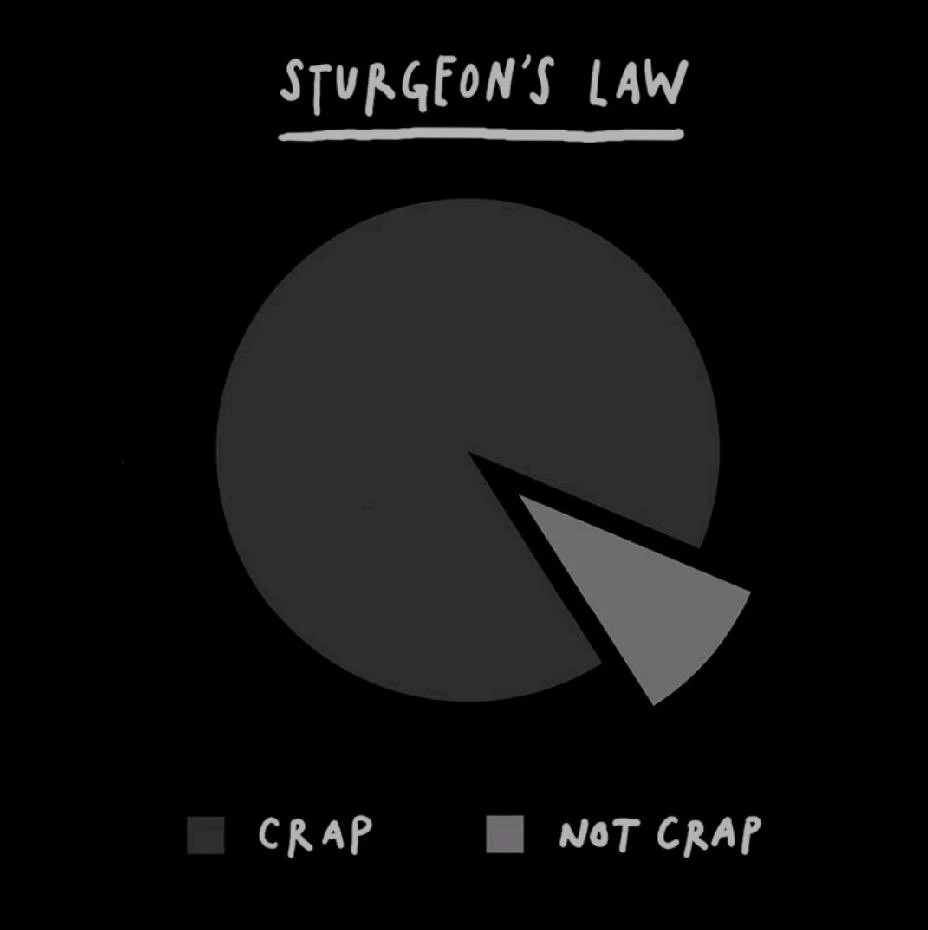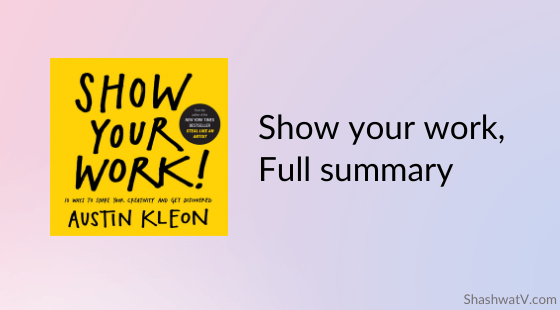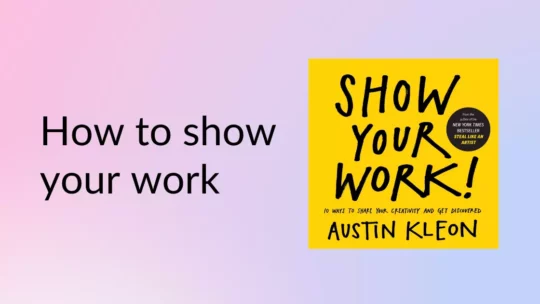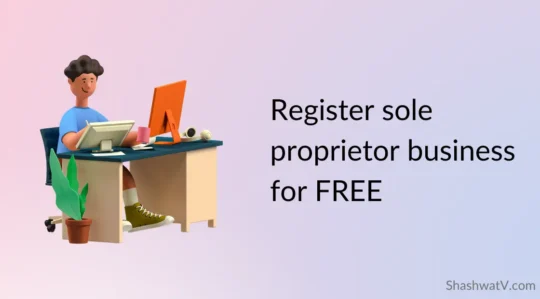Table of Contents
Introduction
Everyone wants followers, but not everyone is willing to work for it. All you got to do is to show your work to the world. The book talks about how to build an audience or a group of people who are interested in what you do, make, or share. And while you do so you build strong rapport and connections which then could be leveraged to finance, support, and appreciate you in your journey or a lot more.
Consists of 10 chapters covering all the problems people face regarding self-promotion, the chapters are to the point and don’t waste time on random things. This is a full summary with notes and highlights. Can be read quickly and is practical in nature backed up by the writer’s experience. Want to read a short summary instead? Read here.
Chapters, Notes, and lessons learned
You don’t have to be a genius
- Creativity is not a talent. It is a way of operating.
People tend to think that you have to be a genius to make something that attracts everyone’s attention. The author calls it the “lone genius”. In short, the cliché personality we’ve been seeing in movies/shows where the person is just too busy in their lab/studio and an idea strikes on which they work for days and months and finally come out with something GREAT, which attracts everyone/’s attention and finally they’re famous.
In reality, it is contrary to this, creativity is an inclusive and social sport rather than just one isolated piece of thing.
Spending the majority of your time, energy, and attention practicing a craft, learning a trade, or running a business, while also allowing for the possibility that your work might attract a group of people who share your interests. All you’ve to do is show your work.
- Give what you have. To someone, it may be better than you dare to think.
In the beginner’s mind, there are many possibilities, in the expert’s mind, there are few.
Shunryu Suzuki
When you are just a beginner in a field, say coding, or design. You have tons of questions and ideas about what you can do. And many of those are good as well as bad. However, until you make it happen you don’t know what opportunities it can bring for you.
In my personal experience, when I learned how to make bots. I right away made something useful even though that was a cliché idea. Despite that, the bot blew my mind when it reached 5000 users and was promoted on a channel having 100k subscribers on telegram. I was a freaking amateur in making bots I TELL YOU.
- Read obituaries/biographies
One of my favorite ones.
Remembering that I’ll be dead soon is the most important tool I’ve ever encountered to help me make the big choices in life. Because almost everything — all the external expectations, all pride, all fear of embarrassment or failure — these things just fall away in the face of death, leaving only what is truly important. Remembering that you are going to die is the best way I know to avoid the trap of thinking you have something to lose. You are already naked.
~ Steve Jobs.
Think process, not product.
- In order for connection to happen, we have to allow ourselves to be seen — really seen.
Find interesting ways to tell your story to the world and give a medium to people to connect with you if they want to. Even if you’re into boring stuff (nothing is boring though, it’s subjective) that general people think is boring like accounting, etc. Find a way to make it interesting, just like data visualization makes data interesting to look at.
Tell stories with your experience embedded into it, people are ready to listen.
- No one going to give a damn about your resume; they want to see what you have made with your own little fingers. Become a documentarian of what you do.
21st-century skills require you to have proof of work, you’re only as good as the work you show/put out in the world. The more practical thing it is, the better is to have projects built while learning which have real-world value. Doesn’t matter how simple it is. Get a case study of what you built and learned through the process.
Share something small every day.
- Put yourself, and your work, out there every day, and you’ll start meeting some amazing people.
The more connections you have the more opportunities you get, however, if you’re not showing what you’re doing and what things are interesting to you, you can’t find like-minded people who maybe are more experienced than you. So there will be a flow of knowledge. I published my first technical post and now it has more than 15,000 page views. After that, I got contacted people to write on their platforms. And more importantly, I got my first paid gig for writing because of this; wouldn’t have been made possible if I didn’t take the action to publish my very first one.
What, and how you should share?
The form of what you share doesn’t matter. Your daily dispatch can be anything you want – a blog post, an email, a tweet, a YouTube video, or some other little bit of media. There’s no one none-side-fits-all plan for everybody.
- If you work on something a little bit every day, you end up with something that is massive – Kenneth Goldsmith
This is called the snow-balling effect, you start with something that is very small, like 0 followers, subscribers, users, or customers, etc. However, slowly and surely you’ll build a massive empire of things all you need is consistency and perseverance.
That’s how Ali Abdaal started, here’s the video which inspired me to read this book.
If you don’t see any growth it’s time to change the strategies you’re following, consistency is in terms of daily/monthly work you put in. However, the strategies to reach your goal can change and are dynamic in nature.
Open up your cabinet of curiosities
- A lot of the writers I know see the act of reading and the act of writing as existing on opposite ends of the same spectrum. The reading feeds the writing, which feeds the reading.
This is true for all the fields that have creative or artistic ways of expression. Be it video making, blogging, writing, or content creation in any field/platform, etc.
If you’re a designer or learning design, the best way to feed your mind with ideas is to look for other creative works by people. Be it any discipline, you only get to understand and develop your own thought processes when you know what other people do, and how they work.
So don’t be shy, try copying, imitating pieces of work, however, don’t forget to give proper credits. That’s how you develop your own processes and get inspired by other people’s work.
- Do what you do best and link to the rest. ~ Jeff Jarvis

Let’s make things clear, the 80/20 or Pareto’s principle is applicable in tons of places, so is here.
80% of work you do will be crap, or not as good as you think it should be. However, you’ll be known for 20% of the best work you put out. It is how things are, not every piece of writing, artwork, painting, or design will be good as you think. There are awful ideas and so there are awful projects.
Just make sure you keep going and making stuff; those pieces of bad work are actually going to help you reach your best work.
Tell good stories.
“You might think that the pleasure you get from a painting depends on its color and its share and its pattern, “says Paul Bloom. “And if that’s right, it shouldn’t matter whether it’s an original or a forgery.” “Stories are such a powerful driver of emotional value that their effect on any given object’s subjective value can actually be measured objectively.” The stories you tell about the work you do have a huge effect on how people feel and what they understand about your work and how people feel and what they understand about your work affects how they value it.
Teach what you know
The impulse to keep to yourself what you have learned is not only shameful, it is destructive. Anything you do not give freely and abundantly becomes lost to you. You open your safe and find ashes.
~ Annie Dillard.
Make people better at something they want to be at. Teaching people doesn’t subtract value from what you do, it actually adds to it.
Don’t turn into human spam.
If you want to get, you have to give. If you want to be noticed, you have to notice. Shut up and listen once in a while. Be thoughtful. Be considerate. Don’t turn into human spam.
Learn to take a punch
Whatever you do, how you do it, is always going to be hated by someone online. These people exist to suck out your energy, IGNORE them, and don’t ever let them get into your head.
There’s always a sweet block button that you can put to use, you might have already experienced backlashes online if you share your ideas, opinions, or anecdotes.
“The trick is not caring what everybody thinks of you and just caring about what the RIGHT people think of you.”
~ Brian Michael Bendis
Sell out
- When people love work, they may help you financially
“Sellout… I’m not crazy about that word. We’re all entrepreneurs. To me, I don’t care if you own a furniture store or whatever — the best sign you can put up is sold out.”
~ Bill Withers
When you go for building a community around what you do and share, you build valuable connections along the way that you can leverage later on, in all sorts of ways. If you’re a personal brand you can sell courses, content, cheat sheets, swipe files, apps, software, literally anything. If you have numbers to show, people will approach to offer you money to advertise their products/services.
It’s the same for business as well, a single-person company or multi-national one, they have built rapport and trust. It will take time, but you’ll reach that point.
Whether you ask for donations, crowdfund, or sell your products or services, asking for money in return for your work is a leap you want to take only when you feel confident that you’re putting work out into the world that you think is truly worth something. Don’t be afraid to charge for your work, but put a price on it that you think is fair.
- Make money and help others too
“We don’t make movies to make money, we make money to make more movies”
~ Walt Disney
You just have to be as generous as you can, but selfish enough to get your work done. – When you’re famous even mildly on the internet, it’s hard to manage your work core and network with people that care about your work. So find a sweet spot or a process that works for you. For example, collecting all the questions people have and answering them single-handedly via a post or a video.
Stick around
- Work is never finished, only abandoned – Paul Valery
Now you’re deep into what you’ve been doing for a long-time. The processes, systems, goals, are never-ending. One goes, another is next on the door. Give yourself time to breathe and rejuvenate.
We work because it’s a chain reaction, each subject leads to the next.
If you’ve already been through the exhaustion you know it’s bad. Take time to get to the balance and flow. In short, you’re going to be working your ass off to accomplish stuff.
Add this to your schedule (I know it’s cliché) –
- Take frequent breaks
- Don’t forget to live life.
- Go water plants and take a walk.
- Your body needs rest and water. (exercise if you can)
Conclusion
I hope you found this summary on Show your work by Austin Kleon insightful and motivating to start your own journey of self-promotion. You just got to take action and implement strategies in your own way. Visit my blog to read more stories by me on self-promotion.
Start with this one, How I got 3000+ telegram bot users overnight. See ya!


